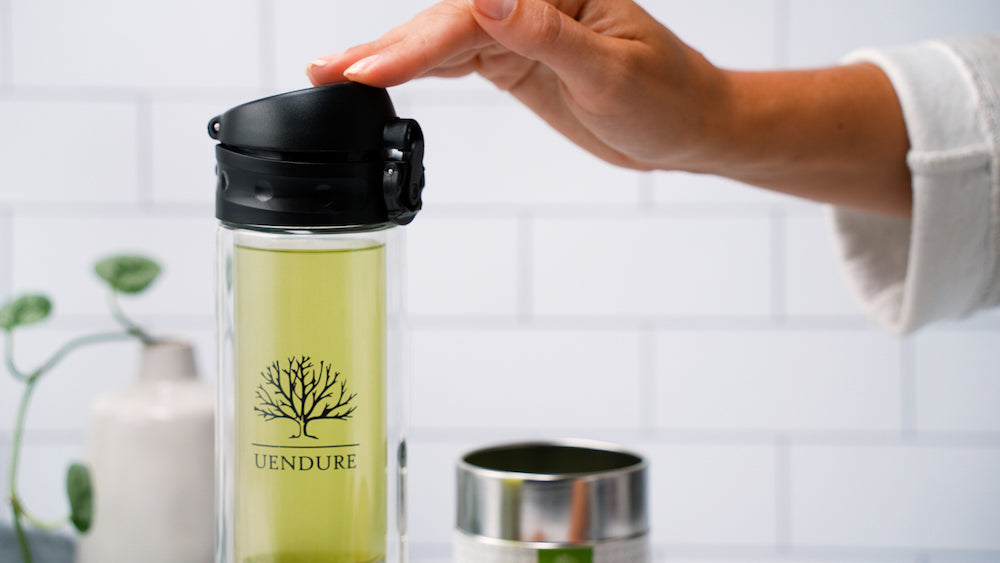Save 15% when you buy the Original Bottle Bundle!

How Raspberry Leaf Supports Hormones and Balances Women’s Health Naturally
Raspberry leaf has been revered for centuries as a powerful herbal remedy for women’s health. Traditionally used in both pregnancy and menstrual support, raspberry leaf tea is often referred to as "the woman’s herb" due to its profound benefits on the reproductive system. Whether you are expecting a baby or struggling with painful, irregular periods, raspberry leaf may provide the natural relief and balance your body needs.*
Let's explore the many benefits of raspberry leaf for pregnant women and those dealing with difficult menstrual cycles.
A quick personal note from the author: A couple of real-world examples that made me a believer - My niece and my sister-in-law both experienced short and relatively easy deliveries after daily consumption of our maternity tea which has a high concentration of raspberry leaf, during their third trimester. Fun Fact: My sister-in-law delivered her son at home, and he arrived so quick, the midwife almost missed the delivery!
What is Raspberry Leaf?
Raspberry leaf comes from the red raspberry plant (Rubus idaeus), commonly known for its sweet berries. However, the leaves of the plant hold significant medicinal value, particularly for women’s reproductive health. Packed with vitamins, minerals, and beneficial plant compounds, raspberry leaf has been a staple in herbal medicine for centuries.
Nutritional Profile of Raspberry Leaf
- Raspberry leaf is rich in essential nutrients, including:
- Vitamins: Vitamin C, Vitamin E, and several B vitamins
- Minerals: Magnesium, calcium, potassium, and iron
- Antioxidants: Flavonoids and tannins, which help reduce inflammation
- Fragrine: A plant compound that helps tone and strengthen the uterus
This unique combination of nutrients makes raspberry leaf an excellent herbal remedy for women seeking hormonal balance, menstrual relief, and a smoother pregnancy experience.
Raspberry Leaf Benefits for Pregnancy
Raspberry leaf has long been recommended by midwives and herbalists as a supportive tonic for pregnant women, particularly in the third trimester. Here’s how it can benefit expectant mothers:
1. Strengthens the Uterus
One of the most well-known benefits of raspberry leaf is its ability to tone and strengthen the uterus. The compound fragrine helps tighten and support the uterine muscles, which can lead to more efficient contractions during labor. Stronger uterine muscles may also reduce the risk of prolonged labor and postpartum hemorrhage.
2. May Shorten Labor Duration
According to the National Institute of Health, studies suggest that women who consume raspberry leaf tea in the later stages of pregnancy may experience shorter and less painful labors. The toning effect of the herb prepares the uterus for contractions, leading to a more coordinated and efficient birthing process.
3. Eases Morning Sickness and Digestive Issues
Many pregnant women struggle with nausea, bloating, and constipation. The high nutrient content of raspberry leaf supports digestive health and can help alleviate nausea, making it a great alternative to pharmaceutical remedies.
4. Reduces the Risk of Pregnancy Complications
Raspberry leaf contains calcium and magnesium, which support overall muscle relaxation and nerve function. This can help prevent preeclampsia, high blood pressure, and excessive bleeding after birth.
5. Supports Breastfeeding and Postpartum Recovery
After childbirth, raspberry leaf continues to be beneficial by helping the uterus return to its normal size. It is also believed to support milk production in breastfeeding mothers, making it a valuable postpartum herb.
Raspberry Leaf for Menstrual Health
For women who experience heavy periods, painful cramps, or irregular cycles, raspberry leaf can provide much-needed relief.
1. Reduces Menstrual Cramps
Raspberry leaf has anti-inflammatory and muscle-relaxing properties, which help ease painful uterine contractions during menstruation. The magnesium content also works as a natural muscle relaxant, reducing the severity of cramps.
2. Balances Hormones and Regulates Periods
Women dealing with irregular or heavy menstrual cycles can benefit by drinking raspberry leaf tea due to its hormone-balancing effects. The herb supports the endocrine system, helping regulate estrogen and progesterone levels, leading to more predictable and less painful periods.
3. Supports Iron Levels and Reduces Fatigue
Heavy periods can lead to iron deficiency and fatigue. Raspberry leaf contains iron and vitamin C, which work together to support red blood cell production and combat anemia-related tiredness.
4. Soothes PMS Symptoms
Mood swings, irritability, and bloating are common premenstrual symptoms. Raspberry leaf possesses a calming and anti-inflammatory effect to help reduce stress, ease bloating, and stabilize mood swings, making it a great natural remedy for PMS relief.
How to Use Raspberry Leaf
Raspberry leaf is most commonly consumed as a tea, tincture, or capsule. Here’s how to incorporate it into your routine:
1. Raspberry Leaf Tea
This is the most traditional and effective way to enjoy the benefits of raspberry leaf.
How to Make Raspberry Leaf Tea:
- For pregnancy: Steep 1–2 teaspoons of dried raspberry leaf in hot water for 10–15 minutes. Drink one cup per day in the second trimester and up to three cups per day in the third trimester.
- For menstrual support: Drink one to three cups daily throughout your cycle or increase consumption before and during your period for cramp relief.
2. Raspberry Leaf Tincture
A tincture is a concentrated liquid extract of the herb. It is typically taken in dropper form, added to water or juice. Follow the dosage instructions provided by your herbalist or product label.
3. Raspberry Leaf Capsules
For convenience, raspberry leaf is available in capsule or tablet form, ideal for those who prefer not to drink tea.
Precautions and Considerations
While raspberry leaf is generally safe, it is important to use it with care, especially during pregnancy.
Who Should Avoid Raspberry Leaf?
- Women in their first trimester of pregnancy should avoid consuming raspberry leaf, as it may stimulate uterine contractions too early.
- Those with a history of preterm labor or high-risk pregnancy.
- Women with heavy menstrual bleeding should consult a healthcare provider before use, as raspberry leaf may increase blood flow.
- If you are on blood-thinning medications or have a history of endometriosis or fibroids, consult your doctor before taking raspberry leaf.
Final Thoughts
Raspberry leaf is a powerful natural remedy for pregnant women and those struggling with menstrual discomfort. Its ability to tone the uterus, ease labor, relieve cramps, and balance hormones makes it a staple in women’s herbal medicine. Whether you’re preparing for childbirth or looking for relief from difficult periods, raspberry leaf tea may be a gentle yet effective solution for your wellness journey.
If you’re considering adding raspberry leaf to your routine, start with a moderate dose and consult a healthcare professional, especially if you are pregnant or have an existing health condition.
Have you tried raspberry leaf tea? Share your experience in the comments below! Interested in trying raspberry leaf? visit us: https://uendure.com/products/uen-raspbr
*Disclaimer: These statements have not been evaluated by the Food and Drug Administration. This product is not intended to diagnose, treat, cure, or prevent any disease.
It is always a good idea to consult your healthcare professional before starting a new supplement, especially when pregnant or if you have a medical condition.


